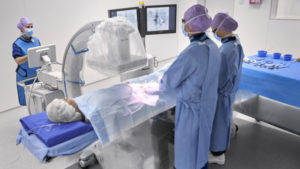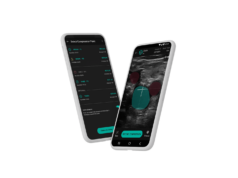
Royal Philips has announced physicians will now have access to advanced new 3D image guidance capabilities through its image-guided therapy mobile C-arm system—Zenition. The system will deliver enhanced clinical accuracy and efficiency, according to Philips, and aims to improve outcomes for patients undergoing endovascular treatment. The company has signed a strategic partnership agreement with Cydar, a United Kingdom-based provider of cloud-based procedure maps software to plan and guide surgery in real time.
As patient numbers rise and procedures become more complex and time-consuming, patient-specific real-time procedure planning and guidance, optimization of equipment utilization, and usability have become ever more important. To help overcome these challenges, Philips details that its image-guided therapy mobile C-arm system—Zenition—brings together innovations in image capture and processing, ease-of-use, and versatility, many of which were pioneered on Philips’ image-guided therapy platform Azurion. Like Azurion, the Zenition mobile C-arm system allows hospitals to maximize operating room performance, enhance their clinical capabilities, and provide staff with a seamless user experience, the company claims.
The integration of Cydar EV Maps software into the Zenition platform now adds extended procedure planning and real-time 3D guidance capabilities.
Cloud-based AI and computer vision
Philips states that Cydar EV Maps assists in the planning, real-time guidance, and postprocedure review of the endovascular surgery. It brings cloud-based artificial intelligence (AI) and computer vision to mobile surgery, enabling reductions in radiation exposure, fluoroscopy time, and procedure time together with improved ease of use. It enables surgeons to create a detailed, patient-specific 3D map of the target vasculature to help plan surgery, the company adds, and then uses these maps to augment intraoperative live image guidance, updating the maps in real time to account for deformations during surgery, such as guidewires and instruments deforming the patient’s blood vessels.

Philips notes that Cydar EV also facilitates post procedure outcome analysis. The combined result of this integration of procedure planning, guidance and review is that surgeons can work more accurately and efficiently—enabling an approximate 50% reduction in radiation exposure, a significant reduction in fluoroscopy time and a reduction of procedure times by more than 20%, according to Philips, all while helping achieve better outcomes for patients.
Cydar EV Maps is currently in use across the EU, U.K. and U.S. It is certified Software-as-a-Medical Device with EU CE mark and Food and Drug Administration (FDA) 510(k) clearances.












